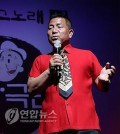- California Assembly OKs highest minimum wage in nation
- S. Korea unveils first graphic cigarette warnings
- US joins with South Korea, Japan in bid to deter North Korea
- LPGA golfer Chun In-gee finally back in action
- S. Korea won’t be top seed in final World Cup qualification round
- US men’s soccer misses 2nd straight Olympics
- US back on track in qualifying with 4-0 win over Guatemala
- High-intensity workout injuries spawn cottage industry
- CDC expands range of Zika mosquitoes into parts of Northeast
- Who knew? ‘The Walking Dead’ is helping families connect
Ex-USFK commander says he would increase military pressure on N. Korea
A former U.S. Forces Korea commander said Wednesday he would respond to North Korea’s recent provocations with increased pressure, such as bringing strategic assets into the Korean Peninsula and conducting joint military exercises as planned.
Ret. Gen. Vincent Brooks, who headed the 28,500-strong USFK from 2016 to 2018, said the North Koreans need to feel “agitated” about the consequences of their actions against South Korea, which in recent days have included the destruction of an inter-Korean liaison office and repeated threats to redeploy troops to border areas.
Brooks noted, however, that increased military pressure on North Korea must go hand in hand with efforts to engage the regime.
“We would be seeking ways to increase pressure with the military instrument, while at the same time not foreclosing the necessary engagement that North Korea seems to have closed the door on, but really hasn’t yet,” he said during a virtual seminar hosted by the Center for Strategic and International Studies, explaining the actions he would take as current commander of USFK.
“And that would mean things like announcing now that we’re going to lift the embargo on bringing strategic assets into the Korean Peninsula, which really hasn’t happened since the spring of 2018,” Brooks said. “I’m talking about nuclear capable bombers, F-35 joint strike fighters, aircraft carriers, nuclear submarines, all these things that are options to simply show presence.”
North Korea views such military assets as a threat to its security and has constantly called for their removal from around the Korean Peninsula.
“I would also submit that now is a good time to say we’re going to go through with the exercise that’s coming up here in the late summer,” Brooks added, referring to South Korea-U.S. military exercises that anger the North. “And that exercises would no longer be a matter that we would discuss with North Korea — simply is not going to be a matter that they’re going to have any influence over hereafter.”
Brooks said his strategy would be about “analyzing what is it that North Korea values the most,” in response to North Korea’s recent actions to “put at risk what South Korea values.”
“By bringing these back in, it would agitate North Korea,” he said. “North Korea, I believe, needs to be agitated right now as a result of this, so that they feel that they may have overstepped.”
Brooks said he recognizes the potential for miscalculation, which could result in a devastating armed conflict on the Korean Peninsula.
But unless the U.S. and South Korea act now, he said, the North will begin to follow through on its threats to redeploy troops and rebuild guard posts in the Demilitarized Zone. North Korea could also suddenly introduce weapons back into the Joint Security Area, according to the former commander.
“I would expect we would see them show up within the next three to five days, with some sort of work crew at those sites,” Brooks said, also suggesting proposing a meeting with the North’s Korean People’s Army in the border truce village of Panmunjom, through the United Nations Command Military Armistice Commission.
Brooks added that maintaining close military connection between the U.S. and South Korea is “very important” in such times because of the North’s apparent desire to drive a wedge in the alliance.
“Preventing that, depriving North Korea of that, would be one of the first efforts,” he said. “And that would mean very close conversation with the South Korean joint chiefs of staff, particularly with the chairman, with whom I would have interacted on a day-to-day basis; with the minister of defense; with the national security director, as well.”











